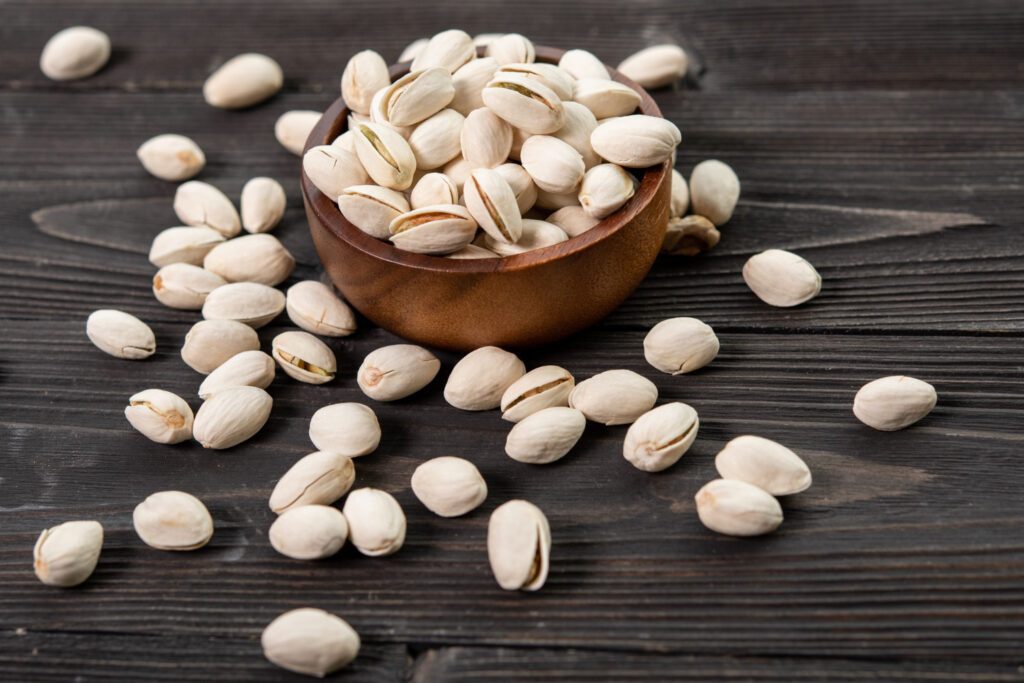Pistachios, often referred to as the “smiling nut” in Iran and the “happy nut” in China, are not only a delicious snack but also a powerhouse of nutrients. These small, green nuts have been enjoyed for thousands of years for their rich flavor and numerous health benefits. In this article, we will explore the nutritional profile of pistachios and delve into the health benefits that make them a valuable addition to any diet.
Nutrition Facts
Pistachios are nutrient-dense nuts that provide a variety of vitamins, minerals, and other beneficial compounds. Here is the nutritional breakdown of a 1-ounce (28 grams) serving of raw pistachios:
- Calories: 159
- Protein: 5.7 grams
- Fat: 12.8 grams
- Saturated Fat: 1.5 grams
- Monounsaturated Fat: 6.8 grams
- Polyunsaturated Fat: 3.9 grams
- Carbohydrates: 7.7 grams
- Fiber: 3 grams
- Sugars: 2.2 grams
- Vitamins:
- Vitamin B6: 0.5 mg (25% of the Daily Value)
- Thiamine (Vitamin B1): 0.23 mg (15% of the DV)
- Vitamin K: 4.2 μg (5% of the DV)
- Minerals:
- Potassium: 291 mg (8% of the DV)
- Phosphorus: 139 mg (14% of the DV)
- Magnesium: 34 mg (8% of the DV)
- Copper: 0.36 mg (18% of the DV)
- Manganese: 0.37 mg (19% of the DV)
Health Benefits
- Rich in Antioxidants: Pistachios are packed with antioxidants, including lutein, zeaxanthin, and polyphenols. These compounds help protect cells from oxidative stress and reduce the risk of chronic diseases such as heart disease and cancer.
- Heart Health: The high levels of monounsaturated and polyunsaturated fats in pistachios are beneficial for heart health. These healthy fats help lower bad cholesterol (LDL) levels and increase good cholesterol (HDL) levels, reducing the risk of cardiovascular diseases.
- Supports Weight Management: Despite their high-calorie content, pistachios can aid in weight management. The protein, fiber, and healthy fats in pistachios promote satiety, helping to reduce overall calorie intake. Additionally, the act of shelling pistachios can slow down eating and contribute to mindful eating practices.
- Blood Sugar Control: Pistachios have a low glycemic index (GI) and can help regulate blood sugar levels. The fiber and healthy fats in pistachios slow down the absorption of sugars into the bloodstream, making them a great snack for individuals with diabetes or those looking to control their blood sugar levels.
- Eye Health: The antioxidants lutein and zeaxanthin found in pistachios are essential for eye health. These compounds protect the eyes from damage caused by blue light and oxidative stress, reducing the risk of age-related macular degeneration and cataracts.
- Digestive Health: Pistachios are a good source of dietary fiber, which promotes healthy digestion. Fiber helps maintain regular bowel movements, prevents constipation, and supports a healthy gut microbiome.
- High in Protein: Pistachios are one of the highest protein-containing nuts, making them an excellent choice for vegetarians and vegans. The protein in pistachios helps build and repair tissues, supports immune function, and provides sustained energy.
- Bone Health: The phosphorus, magnesium, and potassium in pistachios are vital for maintaining strong and healthy bones. These minerals play a crucial role in bone formation, mineralization, and overall bone density.
Ways to Enjoy Pistachios
There are numerous ways to incorporate pistachios into your diet:
- As a Snack: Enjoy a handful of raw or roasted pistachios as a nutritious and satisfying snack.
- Baking: Add pistachios to cookies, cakes, muffins, and other baked goods for a crunchy texture and nutty flavor.
- Cooking: Use pistachios in savory dishes such as salads, stir-fries, and grain bowls.
- Nut Butter: Make or purchase pistachio butter to spread on toast, add to smoothies, or use as a dip for fruits and vegetables.
- Garnish: Sprinkle chopped pistachios over yogurt, oatmeal, or desserts for added flavor and crunch.
Potential Allergies and Precautions
While pistachios offer numerous health benefits, they can also cause allergic reactions in some individuals. Symptoms of a pistachio allergy can range from mild (such as itching and hives) to severe (such as anaphylaxis). Individuals with known nut allergies should exercise caution and consult with a healthcare professional before consuming pistachios.
Conclusion
Pistachios are a nutrient-dense food that offers a wide range of health benefits. From supporting heart health and weight management to promoting eye and digestive health, these small nuts pack a powerful nutritional punch. Incorporating pistachios into your diet can be a delicious and effective way to boost your overall health and well-being. Enjoy them as a snack, in recipes, or as a flavorful garnish to reap the many benefits they have to offer.





